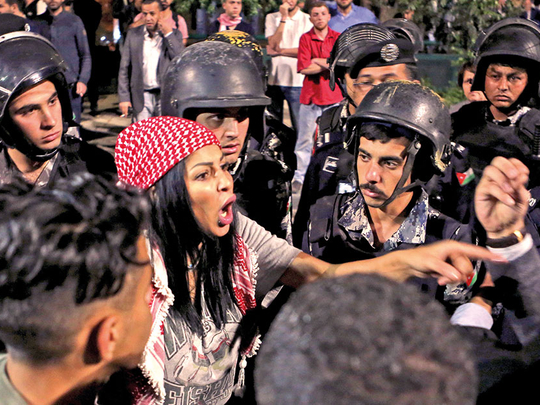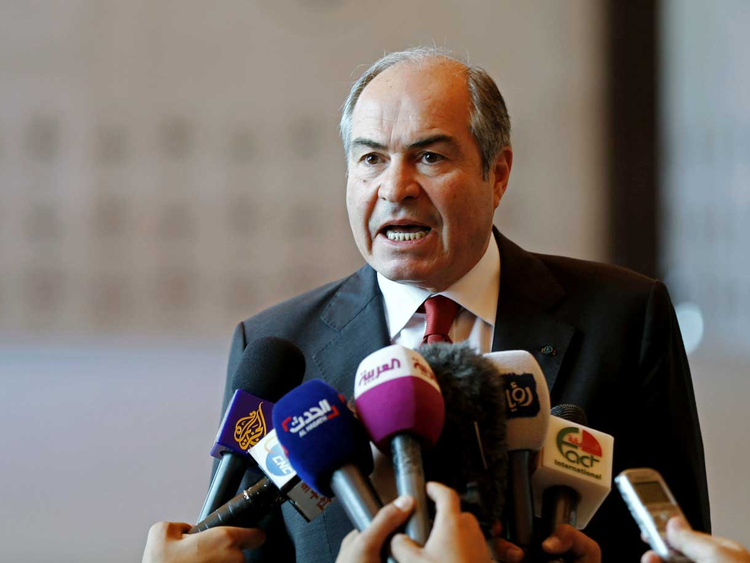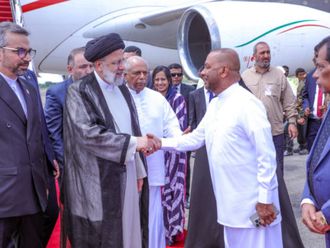
Amman: Jordan’s King Abdullah on Monday asked Omar Razzaz, a former World Bank economist, to form a new government after Hani Mulki resigned as prime minister following the country’s biggest protests in years, a ministerial source said.
The move appeared aimed at defusing popular anger over planned tax hikes that have brought thousands of people onto the streets in the capital Amman and other parts of Jordan since last week.
Razzaz was education minister in Mulki’s government. Mulki resigned from his post as Jordan’s prime minister in a meeting with the king on Monday, an official source said.
Thousands of Jordanians took to the streets of the capital Amman and main provincial towns again on Sunday, extending days of protests that have shaken Jordan, a staunch US ally that has remained stable through years of turmoil in the region.
Protests against policies, not political system
Mohammad Bin Zayed reaffirms UAE support for Jordan's security
Police chief Major General Fadel Al Hamoud said security forces had detained 60 people for breaking the law during the protests and 42 security force members had been injured, but protests remained under control.
“Rest assured, Jordan is a safe and secure country, and things are under control,” said Major General Hussain Hawatmeh, head of the Gendarmerie security department, appearing along with Hamoud at a news conference.
Public anger has grown over government policies since a steep general sales tax hike earlier this year and the abolition of bread subsidies, both measures driven by the International Monetary Fund.
In a sign the tax hikes could be shelved, the Petra news agency, citing the speaker of parliament, said lawmakers were on course to ask the king’s permission to hold an exceptional session, with a majority demanding the changes be withdrawn.
Tax increases
Mulki, a business-friendly politician, was appointed in May 2016 and given the responsibility of reviving a sluggish economy and business sentiment hit by regional turmoil.
The tax increases have caused his popularity to plummet.
The protests, the biggest in Jordan in years, widened on Saturday after Mulki refused to scrap a bill increasing personal and corporate taxes, saying it was up to parliament to decide.
Demonstrators who converged near the Cabinet office said they would disband only if the government rescinded the tax bill it sent to parliament last month.
“The government has made us penniless ... they have left us with no more money in our pockets,” chanted protesters.
Unions call for strike
Unions representing tens of thousands of employees in both the public and private sectors have also called for a general strike on Wednesday after their demands for the bill to be scrapped were rejected by the government.
The government says it needs more funds for public services and argues that the tax changes reduce social disparities by placing a heavier burden on high earners.
Opponents say a tough IMF-imposed fiscal consolidation plan has worsened the plight of poorer Jordanians and squeezed the middle class.
Jordan’s economy has struggled to grow in the past few years in the face of chronic deficits, as private foreign capital and aid flows have declined.
Protesters also criticise politicians for squandering public funds and corruption.
“Our demands are legitimate. No, no to corruption,” chanted the demonstrators urging King Abdullah, who is seen as a unifying force, to intervene and crack down on official graft. Witnesses said demonstrators who converged near the Cabinet office said they would disband only if the government rescinded the tax bill it sent to parliament last month.
In an editorial, the Amman-based Jordan Times noted: “The government, in its attempt to tackle the problem of budget deficit and check rising debts, seems to have acted in a manner that ignored the already heavy burdens that Jordanians are shouldering as a result of the economic situation. Their capital city was recently found by an Economist report as the most expensive Arab city, and the rising prices were making it more difficult for them to get along or to see the light at the end of the tunnel that consecutive prime ministers keep promising.”













